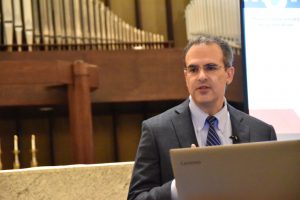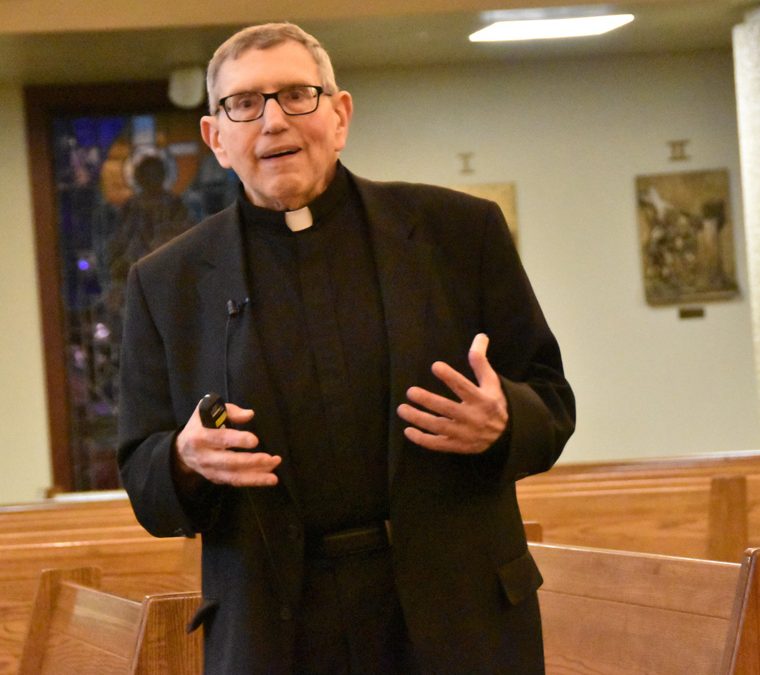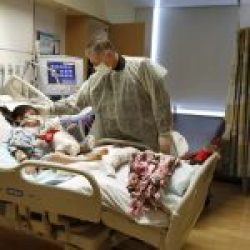Father Charles Vavonese says: “It is edifying to share our moral teachings about the end-of-life with people — it boosts their own spirituality. It’s the grassroots of what we’re supposed to be doing from the medical perspective and from the Church perspective of caring for the sick.” (Sun photo | Tom Maguire)
Sun staff report
A chaplain-doctor duo recently cleared up many misconceptions about Church teaching for patients nearing end-of-life and palliative care.
Father Charles Vavonese is the author of I am the Resurrection and the Life, a resource booklet dealing with end-of-life moral issues; he is also the chaplain of St. Joseph’s Home Health Care’s Mobile Integrated Service Team (MIST). Doctor Paul Fiacco is a family physician who is also president and medical director of CNY AIM, a St. Joseph’s Health Clinically Integrated Network, and a member of Holy Cross Parish in DeWitt.
The priest and doctor spoke at Holy Cross Church in DeWitt and Holy Family Church in Fairmount.
“Your presentation lifted a lot of guilt from me about the decisions that I made when my husband was dying,” wrote one attendee of a seminar held by Father Vavonese and Dr. Fiacco.
“It is edifying to share our moral teachings about the end-of-life with people — it boosts their own spirituality,” Father Vavonese said.
“It’s the grassroots of what we’re supposed to be doing from the medical perspective and from the Church perspective of caring for the sick,” Dr. Fiacco added.
Dr. Fiacco explained that “palliative care means to lessen the severity of the symptoms of an illness but not being able to cure the illness. Palliative care is used to treat, prevent, or relieve the symptoms of a serious or progressive illness.”
Palliative care will enhance the quality of life for patients with, for example, metastatic cancer, stage five renal disease, stage four lung disease, stage four congestive heart failure, and stage four cirrhosis of the liver.

Dr. Paul Fiacco says that “palliative care means to lessen the severity of the symptoms of an illness but not being able to cure the illness. Palliative care is used to treat, prevent, or relieve symptoms of a serious or progressive illness.” (Sun photo | Tom Maguire)
As they near the end of their lives, it is important that patients have an accurate understanding of what the Church teaches. “Unfortunately many people do not understand what the Church teaches about the end-of-life,” Father Vavonese said. “So somehow to put together information about our medical condition and the moral teaching of the Church gives us a road map how we can do that and remain faithful Catholics.”
“Many, many people feel the Church requires that we do everything possible to keep the heart beating at the end-of-life. That is not true, because we believe in eternal life; we also recognize our own mortality,” Father Vavonese explained. “We recognize the human condition, and since we believe in eternal life, we see death is a doorway to Eternal Life with the Lord.”
In 1900, Father Vavonese said, people died of infectious diseases, but now they die of degenerative diseases, and that has resulted in a number of new moral problems and medical issues.
“Pain management is a critical part of the Church’s teaching on the end-of-life,” added Father Vavonese. Dr. Fiacco agrees with Father Vavonese that “patients don’t have to feel like they’re going to be in pain at the end-of-life.” That is an important part of a palliative-care program.
He said audiences are relieved to learn that the Church supports management of pain in the final days. “We may administer morphine for pain,” he said, “even though it would suppress respiration and potentially shorten the life of the patient.” This is permitted by Church teaching when St. Thomas Aquinas’ Principle of Double Effect is applied.
Father Vavonese said that the Church teaches that a patient has the obligation to accept ordinary care that will return the patient to health or provide a benefit.
“Extraordinary care” is different. “If extraordinary care does not offer a benefit to the patient,” he said, “and because it is useless treatment, we can forgo or discontinue that treatment when it does not offer a cure to the patient, especially if the burden of the treatment is great. …
“Pope John Paul II in his encyclical Evangelium Vitae [Gospel of Life] also said that withdrawing extraordinary treatments is not the equivalent of murder or suicide.
“That’s a significant learning for people — they can withdraw the extraordinary treatment or discontinue it and let nature take its course,” Father Vavonese added.
As an example, Father Vavonese cited a woman in her late 80s or early 90s who developed a tumor in her stomach. She and the doctor decided they would not treat it because at that age, undergoing surgery or aggressive chemotherapy would have made the rest of her life very difficult. Instead, she chose to have a quality of life in the time that she had left rather than burdensome treatments that would not cure her cancer. “It’s important that people know that they don’t have to undertake these extraordinary treatments,” Father Vavonese said.
The same treatment can be ordinary care or extraordinary care, depending on the potential benefit to the patient. For example, connecting a patient in the late stages of cancer to a ventilator would be extraordinary care because it would not return the patient to health and would only serve to prolong the person’s death. However, connecting a patient who has pneumonia for several days would constitute ordinary care because it has a benefit (leading to restored health).
“I don’t think medical people … have the code words we use to talk about ordinary and extraordinary care, to talk about burden, to talk about pain management,” Father Vavonese said. “It is our obligation to translate what medical personnel are saying and apply the code words used in our moral teaching to enhance our understanding of what is being communicated to us by medical personnel.”
Palliative-care services in the home
Dr. Fiacco inspired the creation of a program to tackle community-based — as opposed to hospital- or office-based — end-of-life issues because he noticed a gap in care between the end of efforts to cure a disease and entry into hospice. Father Vavonese joined the program as chaplain.
“We’re always trying to offer a cure to patients,” Dr. Fiacco explained. “But at some point you’re going to develop a serious illness, and that serious illness, if we’re not able to cure it, will turn into a terminal illness. And then, unfortunately, what happens is that we can’t provide a cure any longer.”
The gap, he said, between the end of the attempt to cure and hospice, which is for the last six months of life, is “a very lonely time for patients, and it’s almost like an extended burden on the patient and families to even receive care because they’re so sick; and then they have to try to get into the offices for care.”
An example: Dr. Fiacco had a 75-year-old patient who was dying from cancer, and her sister called the office and asked if she could bring her in on a stretcher so that he could examine her.
That case helped inspire him to develop and win grant funding to create the MIST Interdisciplinary Program: the Mobile Integrated Services Team — unique to St. Joseph’s Health. The interdisciplinary MIST team provides care in the patient’s home, instead of resorting to an ambulance, an emergency room, or a stretcher.
MIST care in the home is coordinated with the patient’s primary-care physician. It involves what Dr. Fiacco describes as the “foot soldiers”: nurse-practitioners, home-care nurses, social workers, and Father Vavonese. “We’re providing care where it’s needed rather than burden the family and patient,” Dr. Fiacco said.
Dr. Fiacco ideally wants to add “telemedicine” to the MIST Program as well, with a secure connection that would allow conferences with all of the patient’s family members throughout the country.
End-of-life planning
Dr. Fiacco and Father Vavonese also discussed end-of-life documents and organ donation in their presentation.
Father Vavonese stated that the most important document for a person to complete is the Health Care Proxy and it is the preferred document for Catholics. The Health Care Proxy is a legal document that allows the patient to appoint someone to make health decisions including withholding or withdrawing artificial nutrition and hydration.
Dr. Fiacco and Father Vavonese recommended that people have a frank conversation with their Health Care Proxy about their wishes for their care when they become incapacitated. An excellent resource for this conversation is available at www.conversationproject.org. It is most important that patients communicate to their Health Care Proxies and in their Advance Health Care Directive that they want to be organ donors.
Father Vavonese said the Church also recognizes that organ donation is morally acceptable for patients who are deemed to be brain dead by a physician. A live donor may donate an organ as well. However, he said, the donation must not seriously impair the living donor’s health. “Popes have described [organ donation] as a tremendous act of charity,” he added.
Deacon Dr. Robert Fangio, who in his retirement as a dentist volunteers at Amaus Dental Services, a free clinic in Syracuse, called the presentation “a wake-up call that we’ve got to get our affairs in order. … Is our will up to date? Is our Health Care Proxy up to date? Is power of attorney up to date? Is all of this ready to go, God forbid, if tomorrow was the day?”
An audience member at Holy Family asked about patients who need forgiveness at the end-of-life. Father Vavonese answered: “The Sacrament of the Sick forgives all the sins of our entire life.” Previous to this, the sacrament was called Extreme Unction and was given just before the patient died. At the Second Vatican Council, the council fathers recognized that people needed the grace of the sacrament as they dealt with the issues of aging and illness so they broadened the times when the sacrament may be given.
Audience feedback
Deacon John Falge, a former Syracuse police chief who has a law degree, was asked what he got out of the presentation. He often visits Francis House, a home for people who are terminally ill. So many times when he is sitting with them, he said, families will ask questions that are almost like a moral or a theological test of how much treatment people have to get: “How far should we go? Are we hurting them or helping them?
“And Father and Doctor put on a great presentation and hit on a lot of the critical points of not just medicine but what the Church teaches us — to be kind and compassionate; at the same time provide the care people need without going overboard and hurting them.”
Maria Filippo, a parishioner at Holy Family, said she attended because a family member was in the hospital at the end of his life. She said: “The determination of what is maybe burdensome or what is extraordinary is very subjective; and that helped me realize that I shouldn’t be so upset because somebody has a difference of opinion [in] this very stressful period in our lives.”
Maureen Walsh, of St. Patrick Church in Binghamton, had been instructed by Father Vavonese in the Formation for Ministry program. She said of the Holy Family presentation: “I had family members, had four actually, that decisions had to be made. And this says it all. … It gives a peace of knowing — you know the right thing to do.” She would like to see the presentation come to Binghamton too.
Elaine Lostumbo, retired after many years as a registered nurse, worked for four years at hospice and two years at Francis House. She attended the presentation in order to find out how families are understanding the whole process of death and dying. She gave high marks to Father Vavonese for explaining the sacraments and what is acceptable in the Church; and to Dr. Fiacco for explaining palliative care and medical papers such as Do Not Resuscitate, a Living Will, and the Health Care Proxy.
“I think it was a very productive program,” she said, “and I think that they may want to do it again somewhere, because I think there’s more of a population out there that would probably want to hear it again.”
End-of-life resources
• Click here for presentation handouts and resources
• Click here for “I am the Resurrection and the Life”
• Click here to contact palliativecare@syrdio.org or call (315) 960-6997
• National Catholic Bioethics Center’ Ethicist-on-Call: Visit The National Catholic Bioethics Center website or call (215) 877-2660, 24 hours a day, seven days a week. Follow the prompts to leave a message and an ethicist will be paged and respond to your call. (Father Vavonese recommends putting that number in your phone now so that it will be available when it is needed.)






